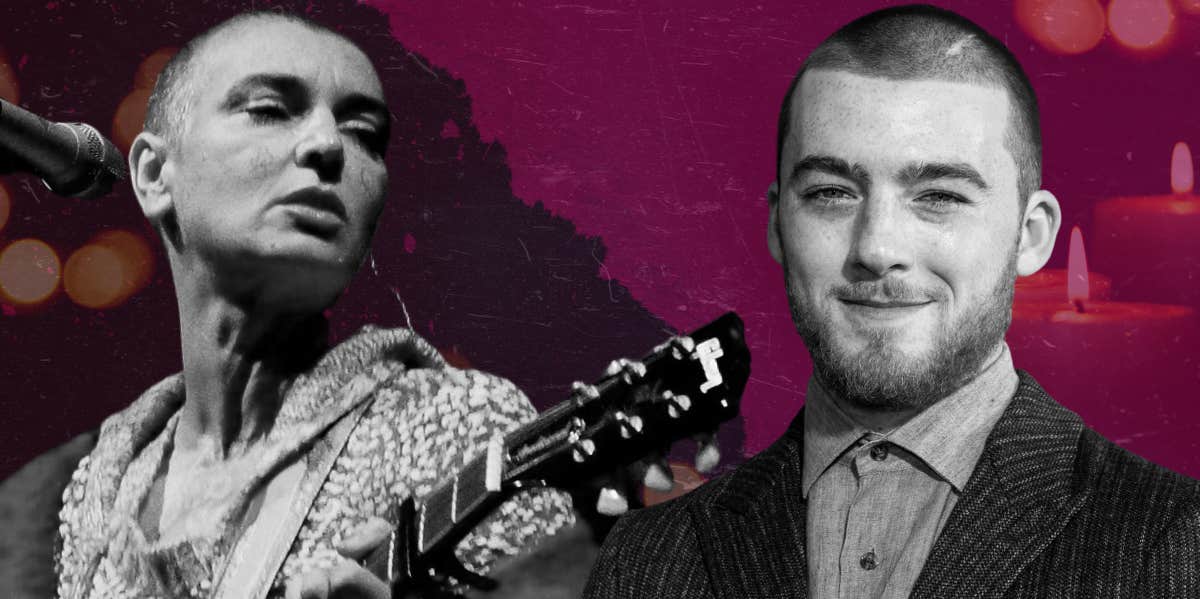Angus Cloud & Sinéad O’Connor Prove We Have To Acknowledge The Unbearable Pain We Feel When Someone We Love Dies
The recent deaths of Angus Cloud and Sinéad O'Connor show how deeply people are affected by losing loved ones.
 NikolaVukojevic via Getty Images / Man Alive!, CC BY 2.0 via Wikimedia Commons / Eugene Powers via Shutterstock
NikolaVukojevic via Getty Images / Man Alive!, CC BY 2.0 via Wikimedia Commons / Eugene Powers via Shutterstock There are few given certainties along anyone’s life journey. Employment comes and goes, relationships are never static. Yet there’s one universal, unifying element of being human that connects us: all of us who are born into this Earth will someday leave it.
In the wake of the collective trauma of a worldwide pandemic, death has become somewhat normalized, almost verging on mundane. Despite our proximity to loss and grief, we lack a shared lexicon to express how the death of a loved one shifts the ways we continue to exist.
The recent deaths of Angus Cloud and Sinéad O’Connor prove we have to acknowledge the unbearable pain we feel when a loved one dies.
Cloud, best known for his breakout role as Fez on the show Euphoria, died on July 31, 2023, in Oakland, California. He was 25 years old.
Cloud’s family released a heart-wrenching statement about their loss, announcing, “It is with the heaviest heart that we had to say goodbye to an incredible human today. As an artist, a friend, a brother and a son, Angus was special to all of us in so many ways.”
Their statement mentioned the recent sorrows Cloud went through, noting, “Last week he buried his father and intensely struggled with this loss. The only comfort we have is knowing Angus is now reunited with his dad, who was his best friend.”
As his family begins the process of grieving, they explained that their hope is for Cloud to be remembered for what he brought into the world.
“Angus was open about his battle with mental health and we hope that his passing can be a reminder to others that they are not alone and should not fight this on their own in silence,” the statement continued. “We hope the world remembers him for his humor, laughter and love for everyone.”
The exact cause of Cloud’s death is unknown, yet as time pushes on, that information will become part of public discourse. It’s possible that Cloud’s life will be reduced to the way he died, as though that’s the entirety of who he was. It often seems like the cost of fame is the absence of a privately-defined life. Ultimately, Cloud’s family owes no one an explanation for how he died, as they work to navigate their lives without him.
When Cloud died, he was mourning the loss of his father. Burying a parent is a defining point in anyone’s life. Our parents bring us into this world. When they leave us, it creates an elemental change in who we are and how we move through our existence.
Sinéad O’Connor’s death on July 26, 2023, came almost a year after she lost her 17-year-old son, Shane, to suicide in January 2022.
In a series of tweets on July 17, 2023, O’Connor expressed the depths of that loss and her ongoing heartache. She wrote, “Been living as undead night creature since. He was the love of my life, the lamp of my soul. We were one soul in two halves. He was the only person who ever loved me unconditionally. I am lost in the bardo without him.”
Bardo is a Tibetan term that can be defined as “the intermediate state or gap we experience between death and our next rebirth.” For O’Connor to refer to her life after her son’s death as occurring in liminal space is a fitting description of that particular kind of mourning. The fact that she survived her grief for so long shows her innate strength.
As Shane’s mother, O’Connor was her son’s first home. The loss she experienced isn’t one that disappears over time. It’s the kind that ebbs and flows, creating a distinct before and after, while you keep trying to survive.
Mourning is framed as an action with a definitive end. In reality, grieving the loss of a loved one is everlasting.
The death of a loved one is something you never fully move on from. Eventually, you learn to live with the loss. You find ways to manage the chasms of mourning. When you wake up and find that you’re still breathing, you somehow have to accept that your life will continue, despite all the pain you carry.
There’s an overarching attitude in our culture that grief is something we move on from. There’s a mourning period, a specific amount of time when we’re allowed to feel every feeling that accompanies losing a loved one, and then, it’s over. But that’s not really how it works.
Grief is significantly more complex than just five stages. There are days when it feels like a physical entity, a weight we will forever carry.
Cloud and O’Connor both lost people they loved, people whose existence formed them into who they were. It’s time to give voice to how deeply death haunts us, how burying those we love makes ghosts of us all.
Alexandra Blogier is a writer on YourTango's news and entertainment team. She covers celebrity gossip, pop culture analysis and all things to do with the entertainment industry.

